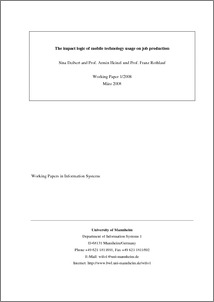|
The impact logic of mobile technology usage on job production
Deibert, Sina
;
Heinzl, Armin
;
Rothlauf, Franz
![[img]](https://madoc.bib.uni-mannheim.de/2015/1.hassmallThumbnailVersion/Workingpaper_Amcis08.pdf)  Vorschau |
|
PDF
Workingpaper_Amcis08.pdf
- Veröffentlichte Version
Download (120kB)
|
|
URL:
|
https://ub-madoc.bib.uni-mannheim.de/2015
|
|
URN:
|
urn:nbn:de:bsz:180-madoc-20152
|
|
Dokumenttyp:
|
Arbeitspapier
|
|
Erscheinungsjahr:
|
2008
|
|
Titel einer Zeitschrift oder einer Reihe:
|
Working Papers / Lehrstuhl für ABWL und Wirtschaftsinformatik
|
|
Band/Volume:
|
08-01
|
|
Ort der Veröffentlichung:
|
Mannheim
|
|
Sprache der Veröffentlichung:
|
Englisch
|
|
Einrichtung:
|
Fakultät für Betriebswirtschaftslehre > Sonstige - Fakultät für Betriebswirtschaftslehre
|
|
MADOC-Schriftenreihe:
|
Area Information Systems and Institute for Enterprise Systems > Working Papers Lehrstuhl für ABWL und Wirtschaftsinformatik (Heinzl) (bis 2011)
|
|
Fachgebiet:
|
330 Wirtschaft
|
|
Normierte Schlagwörter (SWD):
|
Mobile Computing , Arbeitsproduktivität , Neue Technologie , Produktionswirtschaft
|
|
Freie Schlagwörter (Englisch):
|
Mobile technology , job production , construction processes , operational impact , coordination effectiveness , process performance
|
|
Abstract:
|
Research on mobile technologies has received an increasing attention. Most of the existing literature focuses on use of mobile technologies on a managerial level, with technology as a device for information and communication exchange. The impact potential and their corresponding functionalities at the worker level has not yet been analyzed. This study tries to address this gap. It is the key objective to develop a theoretical model how mobile technologies impact business processes in job production (construction industry) on the operational level. Thus, a generic model will be developed on the basis of existing literature, especially the concept of Task-Technology-Fit. It emphasizes how task complexity affects the required effort of individual information access, information capturing as well as the timeliness of information. These mediators will influence the utilization of information for resource planning and coordination which in turn will affect the performance of operational processes. Then, it will be deduced how mobile technologies affect the forces and relationships in this model. There exists a trade-off between the increasing effort to capture information and the reduced effort for accessing information. Moreover, the way how the captured information is utilized for status tracking, resource utilization and resource coordination is considered to be the key factor in improving operational process performance.
|
 | Dieser Eintrag ist Teil der Universitätsbibliographie. |
 | Das Dokument wird vom Publikationsserver der Universitätsbibliothek Mannheim bereitgestellt. |
 Suche Autoren in Suche Autoren in
Sie haben einen Fehler gefunden? Teilen Sie uns Ihren Korrekturwunsch bitte hier mit: E-Mail
Actions (login required)
 |
Eintrag anzeigen |
|
|



 Suche Autoren in
Suche Autoren in